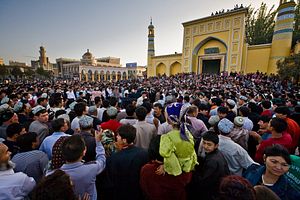China’s recent decision to bar civil servants, students, and teachers from observing Ramadan in the predominantly Muslim Xinjiang Autonomous Region has put China’s troubled relationship with its minority populations back in the spotlight. China has been stepping up its restrictions on religious practice in Xinjiang to try to loosen the Uyghur ethnic group’s adherence to Islam, which they fear is feeding into an extremist-separatist movement. The decision to target students and teachers with this ban is notable because it ties China’s cultural policies to education — a key battleground in the struggle over identity and enfranchisement in minority China and a revealing window into why China’s attempts to pacify its restive frontier seem to be backfiring.
Inequality in education has been a much-scrutinized aspect of minority life in China. Minority populations are, on the whole, poorer and less educated than their Han compatriots, and many commentaries point out that educational inequality leads to unequal economic outcomes, relegating minority populations to “second-class” status even in their native regions. Yet even as the Chinese government invests enormous sums into shoring up education in minority regions, minority relations with the center continue to deteriorate. Expanding Chinese state education seems to be doing little to mitigate these yawning disparities.
The critical reason is that Chinese education policies reflect an inherently paternalistic view of China’s minorities that is encoded in the deepest foundations of China’s minority policy. Similar to the “civilizing” claims used by Western powers to justify colonization, one of the aims of the Chinese approach to minorities is to “assist” their modernization. This attitude was apparent from the earliest days of the People’s Republic: in 1957, then-Premier Zhou Enlai stated that “without mutual assistance, especially assistance from the Han people, the minority peoples will find it difficult to make significant progress on their own.”
State education is thus one among many instruments that the Chinese government uses to advance its “civilizing” goals. (The American education system’s treatment of Native Americans throughout the 19th and 20th centuries comes to mind as an apt analogue.) Textbooks commonly caricature minority cultures and seek to undermine their values. Minority children who enter the state education system are taught that their cultures and beliefs are primitive and savage. These attitudes toward minority cultures pervade the state education system. For example, according to one study from the late 1990s, when asked why certain national curricular changes had not been adopted in Tibet, a Chinese curriculum specialist replied that “the people who live there are backwards, superstitious, and do not believe in science.”
As a result, many minority populations reject state education for their children even when it is made more available to them. Field research in Tibet has shown that increased access to education did not translate into a substantial increase in school enrollment—many families preferred to send their children abroad to Nepal and India or to charity—or diaspora—funded community schools rather than send them to state schools. The same phenomenon has been observed in other minority groups, including the Uyghurs.
Ethnic minorities in China face a painful trade-off: is greater educational and economic opportunity worth the price of giving up their own culture? Many have concluded that it isn’t. Educational and economic marginalization is therefore not only an instrument of oppression unto itself, but a product of minority groups’ own reaction against cultural assimilation. In fact, China’s cultural policies in Xinjiang seem to have driven Uyghurs closer to their religious heritage, not further away. One Chinese academic working in Xinjiang noted to The New York Times that “for a lot of Uyghurs, growing a beard and asking your wife to cover her head in public has become an act of defiance.”
By banning fasting on Ramadan, China once again reinforces the incompatibility of the most basic moorings of Uyghur identity with enfranchisement within the Chinese establishment. It reminds Uyghurs that a heavy toll must be paid to embark on the road to prosperity in China. No amount of material investment will draw China closer together if the Uyghurs and other minority populations are not convinced that they can stake their future success on integration with the Chinese nation.
Andi Zhou is a Program Assistant for the China, East Asia and United States Program, working out of the EastWest Institute’s New York Center.

































